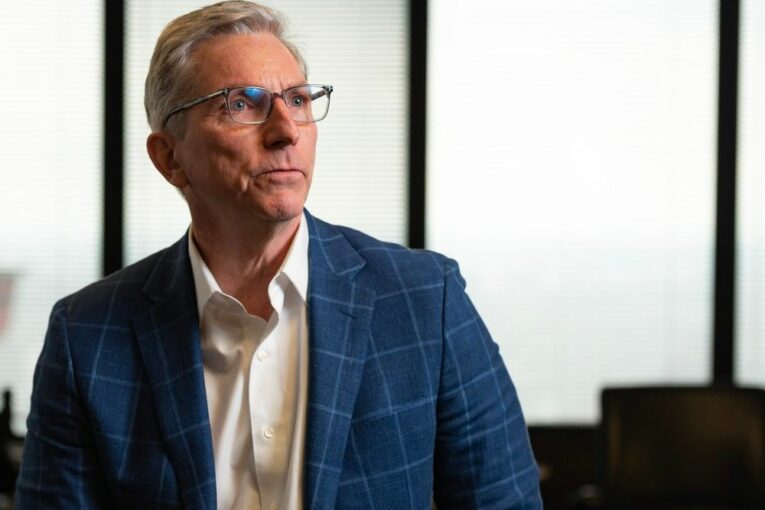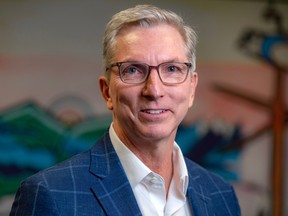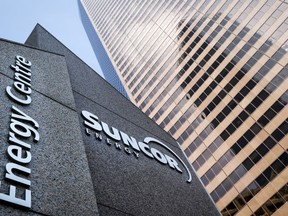
Suncor Energy’s new CEO Rich Kruger wasn’t planning a big return to the oilsands after retiring from the Canadian industry more than three years ago and moving back to the United States.
But when the company began looking for a new leader last year, Kruger — who ran Imperial Oil for nearly seven years until he retired in 2019 — received a call to consider a new opportunity.
The challenge?
Take the helm of his former rival, one of the country’s largest oilsands operators — an integrated producer and owner of the iconic Petro-Canada retail network — and refocus the company after a period of being “down on its luck a little bit.”
“It’s not something I pursued,” Kruger said in an interview Tuesday in Suncor’s headquarters.
“Honestly, I’m not doing this for the money. I’m not doing this for the ego. I just think I can make a difference . . .
“The first three or four replies were, ‘Oh no, you know, I’m retired. I’m this and that.’ But then the wheels start spinning . . . It kind of snowballed. And I honestly believe I’m right where I need to be in life.”
Kruger accepted the job in February. On Tuesday, Suncor held its first annual meeting and quarterly earnings call since he officially took over as CEO last month.
The 64-year-old executive leads a company with a $52-billion market capitalization, more than 16,000 employees and first-quarter production that averaged 742,000 barrels of oil equivalent per day.
It’s also a business that has been caught up in a whirlwind of change over the past year.
This was highlighted by a prominent activist investor calling last spring for a revamp at Suncor due to missed targets, an underperforming share price and safety concerns, including several work site fatalities.
Former CEO Mark Little left the company last July, a day after a contractor died at Suncor’s base oilsands mine.
Later in the year, Suncor’s board examined and rejected a call by Elliott Investment Management to sell Petro-Canada.
However, it now has a new leader, a veteran of ExxonMobil who then became CEO of Imperial Oil in 2013.

In the interview and on an earnings call Tuesday with analysts, Kruger left little doubt that change is coming at Suncor, a company that “in my prior life, it was our No. 1 competitor.”
He also laid out the challenges ahead: improve safety, enhance reliability, lower costs and improve the profitability of Suncor.
The company has underperformed in recent years and Kruger will need to get its various divisions to communicate better and “buy in” to his mandate for change, said Rafi Tahmazian, a senior portfolio manager at Canoe Financial, which owns shares in Suncor.
“It is a very complex business. And it requires someone with the knowledge of it,” Tahmazian said. “There must be incredibly low-hanging fruit there.”
Analyst Patrick O’Rourke of ATB Financial said investors will want to see how the company specifically moves forward with its corporate strategy.
“There is a challenge, in terms of changing investor sentiment toward the name, and I think the only real way to do that is through execution,” he said.
Last year, Suncor boosted its stake in the Fort Hills oilsands mine, which it operates, by buying a 14.6 per cent interest in it from Teck Resources for $712 million.
Earlier this month, Suncor unveiled the $5.5-billion purchase of TotalEnergies’ Canadian assets, including the French company’s 31 per cent in the Fort Hills oilsands mine. It gives the Calgary-based company full ownership of the development.

As part of the deal with TotalEnergies, Suncor also acquires half of the Surmont thermal oilsands project, which is co-owned by ConocoPhillips.
During the first quarter, Suncor also announced the sale of its United Kingdom exploration and production assets, including North Sea properties, to Equinor for about $1.2 billion.
The company posted net earnings of $2.05 billion in the first quarter.
In his first weeks on the job, Kruger has toured about half of Suncor’s major assets. The issues facing Suncor have been tied to its safety performance, along with some operating and reliability concerns, he said.
But Kruger is confident it will improve.
“The company maybe lost a little bit of its operating mojo,” he said.
“This organization is really poised for, I don’t want to call it a turnaround necessarily, but . . . I think this organization is really ready to respond.”
Recommended from Editorial
-

Varcoe: With new CEO at helm, Suncor pulls trigger on blockbuster $5.5B oilsands deal
-

Varcoe: Rich Kruger is back in Canadian oilsands, this time leading Suncor Energy
-

Suncor reports release of water from sediment pond at Alberta oilsands mine
During the company’s earnings call, Kruger spoke about reducing spending in areas where the company isn’t adding value, simplifying what it does and getting “incrementally better at the fundamentals” in its upstream business.
Asked during the interview how long he intends to remain as CEO, Kruger said he had a “very frank conversation” with the board on that question.
The outspoken CEO noted he’s moving back to Calgary and intends to stay on the job as long as he’s having fun, thinks he can help the business reach its potential and the board believes he’s adding value.
“I said as long as those three things are in place, age is just a number,” Kruger added.
“I don’t have a number. I’m here. I’ve sold my house in Texas. All my stuff is coming this way. I’m moving into a house here. So, you know, get used to me . . . I’m here to stay.”
Chris Varcoe is a Calgary Herald columnist.
You can read more of the news on source
